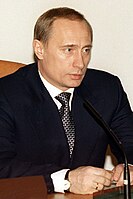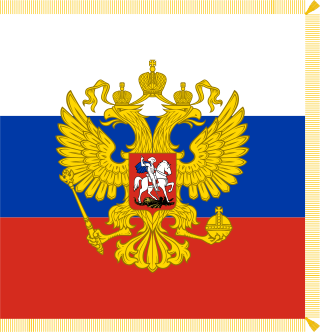
The president of Russia, officially the president of the Russian Federation, is the executive head of state of Russia. The president is the chair of the Federal State Council and the supreme commander-in-chief of the Russian Armed Forces. It is the highest office in Russia.
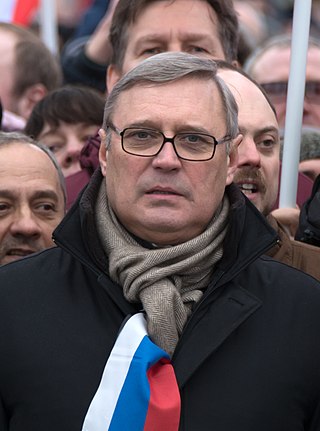
Mikhail Mikhailovich Kasyanov is a Russian politician who served as Prime Minister of Russia from 2000 to 2004. Previously, he had served as First Deputy Prime Minister in 2000 and Minister of Finance from 1999 to 2000. During the 1990s, he worked in President Boris Yeltsin's administration in different positions before joining President Vladimir Putin's first administration. He has the federal state civilian service rank of 1st class Active State Councillor of the Russian Federation.

The Chairman of the Government of the Russian Federation, also informally known as the prime minister, is the head of government of Russia and the second highest ranking political office in Russia. Although the post dates back to 1905, its current form was established on 12 December 1993 following the introduction of a new constitution.

Mikhail Yefimovich Fradkov is a Russian politician who served as Prime Minister of Russia from 2004 to 2007. An Independent, he was the longest serving director of Russia's Foreign Intelligence Service from 2007 to 2016. Since 4 January 2017, Fradkov has been Director of the Russian Institute for Strategic Studies.
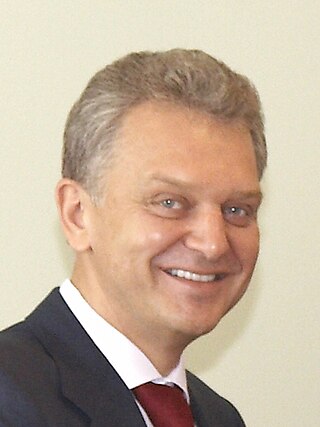
Viktor Borisovich Khristenko is a Russian politician who was chairman of the board of the Eurasian Economic Commission from 1 February 2012 to 1 February 2016. He was First Deputy Prime Minister of Russia from 31 May 1999 to 10 January 2000 and Minister of Industry from 9 March 2004 to 31 January 2012.

Sergey Vladilenovich Kiriyenko is a Russian politician who has served as First Deputy Chief of Staff of the Presidential Administration of Russia since 5 October 2016. He previously served as the 30th Prime Minister of Russia from 23 March to 23 August 1998 under President Boris Yeltsin, and was head of the Rosatom nuclear energy company between 2005 and 2016. Kiriyenko was the youngest Prime Minister of Russia, taking the position at age 35. Ideologically a technocrat, he has played a leading role in the governance of Russian-occupied territories of Ukraine since the Russian invasion of Ukraine.

The Federation Council, unofficially Senate, is the upper house of the Federal Assembly of Russia, the lower house being the State Duma. It was established by the Constitution of the Russian Federation in 1993.

Dmitry Anatolyevich Medvedev is a Russian politician who has been serving as deputy chairman of the Security Council of Russia since 2020. Medvedev was also the president of Russia from 2008 to 2012 and prime minister of Russia from 2012 to 2020.

Mikhail Fradkov's Second Cabinet was the twelfth cabinet of the government of the Russian Federation, preceded by Fradkov's First Cabinet, which followed the cabinet led by Mikhail Kasyanov, who had been dismissed by President Vladimir Putin on February 24, 2004 shortly before the presidential election. It was led by Prime Minister Fradkov, proposed by President Putin for the approval by the State Duma on May 7, 2004, the day Putin entered into his second presidential term. On May 12 Fradkov was approved by the State Duma and appointed Prime Minister by the President. The other 17 ministers of the cabinet were appointed by presidential decrees on May 20, 2004. The prime minister and 16 ministers occupied the same positions in Fradkov's First Cabinet. Only Leonid Reiman assumed the reestablished position of Information Technologies and Telecommunications Minister of Russia. Eight of the ministers took part in Kasyanov's Cabinet, all on the same positions: Yury Chaika, Alexey Gordeyev, German Gref, Sergei Ivanov, Viktor Khristenko, Alexey Kudrin, Leonid Reiman, and Sergei Shoigu.

Viktor Alekseyevich Zubkov is a Russian civil servant, politician and businessman who served as the 36th Prime Minister of Russia from September 2007 to May 2008. He was Vladimir Putin's First Deputy Prime Minister during the presidency of Dmitry Medvedev.

The government of Russia is the federal executive body of state power of the Russian Federation. The members of the government are the prime minister, the deputy prime ministers, and the federal ministers. It has its legal basis in the Constitution of the Russian Federation and the federal constitutional law "On the Government of the Russian Federation". The Apparatus of the Government of Russia is a governmental body which administrates the activities of the government.

Mikhail Fradkov's First Cabinet was a cabinet of the government of the Russian Federation during the presidential election of 2004, preceded by the cabinet of Mikhail Kasyanov, who had been dismissed by President Vladimir Putin on February 24, 2004, and followed by Mikhail Fradkov's Second Cabinet immediately after Vladimir Putin's second inauguration.
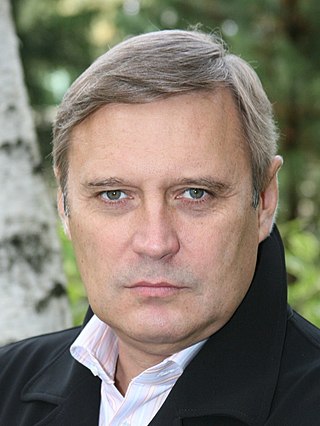
Mikhail Kasyanov's Cabinet was a cabinet of the government of the Russian Federation during most of Vladimir Putin's first presidential term. It followed Vladimir Putin's Cabinet after Vladimir Putin became President of Russia and was replaced with Mikhail Fradkov's First Cabinet shortly before the presidential election of 2004. It was led by Prime Minister Mikhail Kasyanov, proposed by President Vladimir Putin after his inauguration on May 7 and approved by the State Duma and appointed Prime Minister by the President on May 17, 2000. Prior to this, Kasyanov was the Finance Minister in Vladimir Putin's Cabinet, and as Putin was promoted to acting President on December 31, 1999, de facto had led his cabinet since January 10, when he was appointed also First Deputy Prime Minister. Other 28 ministers were appointed by the President on May 18–20. Only six of them were new to the government: Gennady Bukaev, Alexander Dondukov, Alexander Gavrin, German Gref, Alexey Kudrin and Igor Shuvalov.

The acting president of the Russian Federation is a temporary post provided by the Constitution of Russia. The acting president is a person who fulfils the duties of the president of the Russian Federation when cases of incapacity and vacancy occur. However, the person who takes office is more limited in power as the acting president can not dissolve the State Duma, call a referendum, or propose constitutional amendments. This post is held by the prime minister of Russia.

Dmitry Medvedev's First Cabinet was a cabinet of the government of the Russian Federation following the 2012 Russian presidential election that resulted in the election of Vladimir Putin as the fourth President of Russia.

Denis Valentinovich Manturov is a Russian politician who has served as First Deputy Prime Minister of Russia since May 2024. He previously served as Deputy Prime Minister from July 2022 until May 2024 and Minister of Trade and Industry of the Russian Federation from 2012 to May 2024. He was appointed as First Deputy Prime Minister after Andrey Belousov was appointed as Minister of Defense.
The political career of Vladimir Putin concerns the career of Vladimir Putin in politics, including his current tenure as President of Russia.

Mikhail Vladimirovich Mishustin is a Russian politician and economist serving as the current prime minister of Russia since 16 January 2020. He previously served as the director of the Federal Taxation Service from 2010 to 2020.

The 2020 Presidential Address to the Federal Assembly was given by the President of Russia, Vladimir Putin, on Wednesday, January 15, 2020, in the Moscow Manege.

The Mikhail Mishustin's First Cabinet was the federal government of Russia from 2020 to 2024, led by Prime Minister Mikhail Mishustin.
